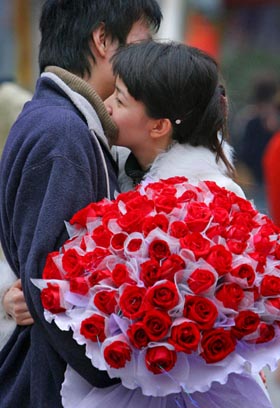China's rich spend big on V-Day
(Reuters)Updated: 2007-02-11 15:32
SHANGHAI - Once considered a symbol of the decadent West, Valentine's Day is becoming big business in newly affluent China.
 A Chinese woman hugs her boyfriend after receiving a bunch of roses during Valentine's Day in Nanjing, capital of east China's Jiangsu province February 14, 2006. [Reuters]  |
This Valentine's Day, Shanghai banker Richard Fan will be buying his wife a 40,000 yuan ($5,146) Cartier wrist watch.
"I think it's a better gift than some 10,000 or 20,000 yuan ($1,300-$2,600) meal," said Fan, 37.
"A gift you can use daily looks much more concrete," he added, blithely.
The watch's price tag is 12 times more than the average Chinese farmer earns in a year.
Among Valentine's Day gift ideas on offer in Shanghai is a $1,000 wine-and-dine package that includes limousine transfers, personal butlers and candle-lit dinners at private concerts.
"People who earn more in Shanghai require something different for their special days," said Joan Pan, a manager at the JW Marriott Hotel, situated on the city's fashionable Nanjing Road, home to outlets of Louis Vuitton, Gucci and Chanel.
This year for Valentine's Day, the hotel is offering a 28,888 yuan ($3,700) package, including an overnight stay in either its Chairman's Suite or the Presidential Suite.
Expensive? Not nearly as much as one hotel which last year offered a Valentine package for a staggering 188,888 yuan ($24,000). The night included a romantic cruise on a luxury yacht along the waters of the Huangpu River.
Even some in the industry were shocked by that extravagance.
"It attracted attention for sure, but I'm not sure it gave people a positive impression," said one Shanghai-based hotel manager, who declined to be identified.
STAR-CROSSED LOVERS
Street cleaner, Xiao Hu, earns about 800 yuan ($103) a month, a sum barely enough to cover the cost of a Valentine's Day dinner at an exclusive Shanghai restaurant.
She, like a majority of Chinese left behind by the economic boom that has brought wealth to a lucky few, is too busy struggling to make ends meet to celebrate a Western love festival.
"The Valentine's Day thing has little to do with me. I'm only concerned that if there are crowds of people they will strew the street with cigarette butts, paper cups and other rubbish," said the 28-year-old.
For many Shanghainese, the most romantic part of the city is the historic Bund waterfront and its art deco buildings.
Today, the Bund is home to some of the city's most upmarket restaurants and bars, including the prestigious Cupola, a small bell tower with commanding views of the river and waterfront and a private dining room for two.
This Valentine's Day, couples are bidding for the chance to enjoy a romantic, candlelight dinner in the private room.
Starting bids open at 5,000 yuan ($645), but the Cupola's management expects the highest bid to surpass 20,000 yuan ($2,580). The proceeds will go to charity.
So far about 20 couples have signed up to bid.
"For some couples, I believe they would feel they got good value for whatever money they spent," said manager Alan Hepburn.
With restaurants and hotels still not fully booked for the holiday, some wealthy Chinese appear to be saving their yuan for the Spring Festival, the most important holiday in the Chinese calendar, which begins four days after Valentine's Day.
Despite the growing popularity of Valentine's Day in China, some Chinese observe their own traditional love festival on the seventh day of the seventh lunar month.
Falling on August 19 this year, Qi Xi is based on a Chinese legend about two lovers -- a cow herder and a fairy -- who fell in love but were separated by a jealous god who created the Milky Way to keep them apart.
Only on Qi Xi could the lovers cross the stars to be together for one night.
($1=7.773 Yuan)
|
||
|
||
|
|